The Main Principles Of Geotheta
The Main Principles Of Geotheta
Blog Article
Some Known Details About Geotheta
Table of ContentsNot known Details About Geotheta Geotheta - TruthsThe Geotheta DiariesNot known Incorrect Statements About Geotheta More About Geotheta

They perform site examinations, collect examples, do research laboratory examinations, and examine data to review the viability of the ground for building and construction jobs - Consulting Engineer. Based on their findings, geotechnical designers provide recommendations for structure layout, slope stability, maintaining structures, and reduction of geotechnical risks. They collaborate with various other specialists, such as designers, architectural engineers, and construction groups, to guarantee that geotechnical considerations are integrated right into the total job design and execution
By evaluating the habits and residential properties of dirt and rock, they can determine prospective geotechnical hazards such as landslides, dirt negotiation, or incline instability. Their knowledge helps prevent failings or mishaps that can threaten lives and residential or commercial property. Below are some comprehensive tasks and obligations of a geotechnical designer: Site Investigation: Geotechnical designers conduct site examinations to gather information on subsurface conditions.
They interpret the data to comprehend the buildings and habits of the dirt and rock, including their strength, leaks in the structure, compaction attributes, and groundwater problems. Geotechnical Analysis and Style: Geotechnical designers analyze the information collected throughout site examinations to analyze the stability and viability of the site for building tasks. They do geotechnical calculations and modeling to assess elements such as birthing capability, settlement, incline stability, side earth pressures, and groundwater flow.
Things about Geotheta
Structure Design: Geotechnical designers play a vital function in making foundations that can securely support the designated structure. They analyze the soil conditions and tons requirements to figure out the proper foundation kind, such as superficial foundations (e.g., grounds), deep foundations (e.g (https://www.huntingnet.com/forum/members/geotheta.html)., heaps), or specialized strategies like dirt enhancement. They take into consideration factors such as settlement limitations, bearing capability, and soil-structure communication to develop ideal foundation designs
They review building and construction strategies, monitor site activities, and conduct area assessments to verify that the layout referrals are complied with. If unforeseen geotechnical problems develop, they assess the situation and provide suggestions for remediation or modifications to the style. Threat Assessment and Mitigation: Geotechnical designers evaluate geotechnical dangers and dangers linked with the job site, such as landslides, liquefaction, or soil erosion.

Cooperation and Communication: Geotechnical engineers work very closely with various other specialists entailed in a job, such as architects, architectural designers, and building and construction teams. Efficient interaction and cooperation are necessary to incorporate geotechnical considerations into the general task design and building procedure. Geotechnical designers give technical proficiency, solution inquiries, and make sure that geotechnical demands are fulfilled.
Some Known Factual Statements About Geotheta
Here are some kinds of geotechnical engineers: Foundation Engineer: Structure designers specialize in developing and examining foundations for structures. They assess the soil problems, load demands, and website features to establish one of the most proper structure type and style, such as shallow foundations, deep foundations, or specialized strategies like pile structures.
They examine the aspects affecting incline stability, such as dirt properties, groundwater conditions, and incline geometry, and establish techniques to prevent slope failings and minimize risks. Quake Designer: Quake next engineers focus on evaluating and developing structures to hold up against seismic pressures. They analyze the seismic danger of a website, review dirt liquefaction capacity, and create seismic layout criteria to ensure the safety and security and durability of structures throughout quakes.
They execute field testing, collect samples, and evaluate the collected information to define the soil homes, geologic developments, and groundwater problems at a website. Geotechnical Instrumentation Engineer: Geotechnical instrumentation designers concentrate on surveillance and measuring the actions of soil, rock, and structures. They set up and preserve instrumentation systems that check factors such as soil settlement, groundwater levels, slope movements, and architectural displacements to evaluate performance and offer early warnings of prospective concerns.
Geotheta for Beginners
They perform tests such as triaxial examinations, loan consolidation examinations, direct shear tests, and leaks in the structure examinations to gather data for geotechnical evaluation and layout. Geosynthetics Designer: Geosynthetics engineers specialize in the layout and application of geosynthetic materials, such as geotextiles, geogrids, and geomembranes. They make use of these products to boost dirt stability, reinforce inclines, give drainage solutions, and control erosion.
They have a tendency to be investigatory individuals, which indicates they're intellectual, reflective, and curious. They wonder, systematic, sensible, logical, and logical. A few of them are likewise social, implying they're kind, generous, cooperative, person, caring, practical, compassionate, skillful, and pleasant. Does this sound like you? Take our complimentary career test to discover out if geotechnical engineer is among your leading occupation matches.
In the workplace setting, geotechnical engineers make use of specialized software program tools to execute calculations, create layouts, and assess information. They prepare reports, evaluation project specifications, communicate with customers and staff member, and coordinate project activities. The workplace setup offers a favorable atmosphere for research, evaluation, and collaboration with various other professionals included in the task.
The Greatest Guide To Geotheta
They often check out job sites to carry out website investigations, analyze geotechnical conditions, and collect information for evaluation. These gos to entail taking a trip to different places, occasionally in remote or tough terrains. Geotechnical designers may execute soil tasting, conduct tests, and monitor building and construction activities to make sure that the geotechnical elements of the task are being applied correctly.
Geotechnical engineers additionally operate in specialized geotechnical labs. In these centers, they carry out experiments, execute examinations on dirt and rock examples, and examine the engineering residential properties of the products. Geotechnical laboratory engineers function extensively in these environments, handling testing equipment, operating instruments, and recording information. They work together with various other research laboratory staff to ensure accurate and trustworthy screening results.
Report this page